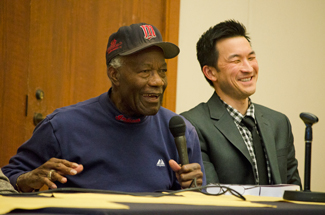Former All-Stars share stories of race, religion
It was an All-Star lineup at the 1912 Center Wednesday, as James “Mudcat” Grant and Vernon Law shared their experiences of race and religion during their baseball careers in the early days of integration.
On the 68th anniversary of the day Jackie Robinson broke the color barrier in Major League Baseball, Law choked back emotion as he spoke about the racism Robinson endured throughout his career.

Nathan Romans | Argonaut
Dan Durbin, director of USC Annenberg’s Institute of Sports, Media and Society, left, and former MLB All-Star James “Mudcat” Grant present during the “Religion and Race in American Sports: Narratives from the Playing Field” event Wednesday at the 1912 Center.
“What I witnessed prior to my pitching there, I could not really believe,” Law said. “That anybody could treat another human being that way.”
Law said Robinson was told to refrain from retaliation no matter what anyone did or said to him. He had to take everything that came at him, because if he retaliated he would close the door for any African-American athletes who come after him.
Law said he witnessed first-hand the name calling and saw players who would spit on Robinson as he slid into second base, as well as many other injustices. People would yell racial slurs from the stands and holler for Robinson to get out of there, that they didn’t need him.
“But baseball did need Jackie,” Law said. “He was a great player, a very intelligent person … He was one of the greatest guys I ever knew.”
Law, originally from Meridian, Idaho, is a former MLB All-Star, World Series champion and Cy Young winner who played for the Pittsburgh Pirates for 16 seasons in the ‘50s and ‘60s.
He became an ordained priest with the Church of Jesus Christ of Latter-day Saints at the age of 17. Being a Mormon in those days of integration proved difficult for Law in his baseball career as well. Other players would sometimes try to test his faith, trying to tempt him with alcohol or women, he said. But Law held strong, as he believed in his faith.
Grant, also a former MLB All-Star and World Series champion, was the first African-American to win 20 games in a season. He grew up in Lacoochee, Florida. He said religion was very important to the children of Lacoochee, but this didn’t stop him from playing baseball on Sundays when he was still in high school. The fans at the time would hide him in a hole under the stands if they saw his mom coming.

Nathan Romans | Argonaut
Former MLB All-Star James “Mudcat” Grant, left, and panel moderator Michael Park, UI journalism instructor, participate during the “Religion and Race in American Sports: Narratives from the Playing Field” panel event Wednesday at the 1912 Center.
“My mom was very smart,” Grant said. “And if she caught me at that baseball game instead of being in church, then — I’m not gonna tell you what happened to me.”
But the people of Lacoochee often needed their faith in the church, Grant said. He said the Ku Klux Klan would drive through town every other Thursday night and shoot into the homes. His mother would hide the children in a trap door under the house, he said.
“Our strength came from paying attention to the wisdom of the minister,” Grant said. “We always thought the fact that we were protected from a religious standpoint gave us confidence then, and not so much of a fear of circumstance.”
Grant said after he graduated high school he became a professional baseball player. From 1958-1971, Grant played in the major leagues, and during his time he endured racism and oppression.
“We could not stay in the same hotel as the rest of the other ball players,” Grant said. “We got threatening phone calls, just like Jackie did. And the threatening phone calls of course was death.”
In 1957, shortly before going into the major leagues, Grant said he fell in love. The woman he loved happened to be white, so when he asked her to go away with him and get married she said no. If they had been married at that time, Grant said he never would have been accepted into the major leagues.
“We didn’t get married until a few years later,” Grant said. “We did get married, and we have been married ever since.”
Mary Malone can be reached at arg-news@uidaho.edu or on Twitter @InkSlasherEdit
